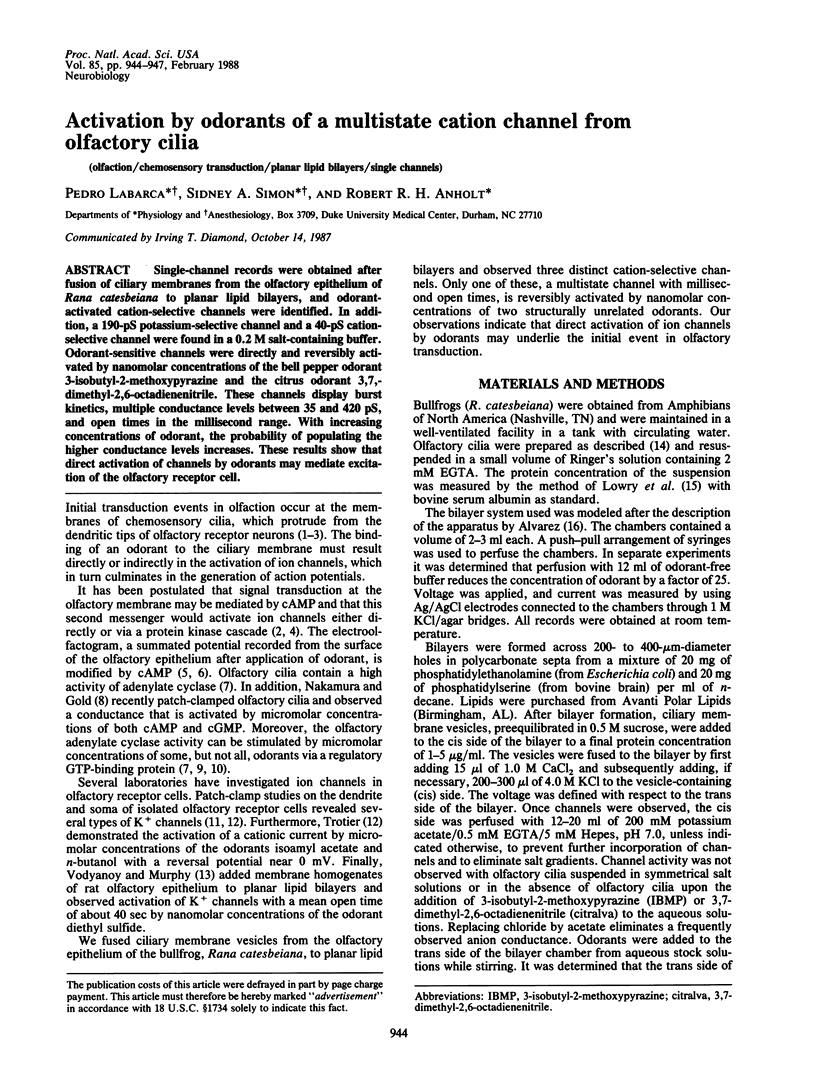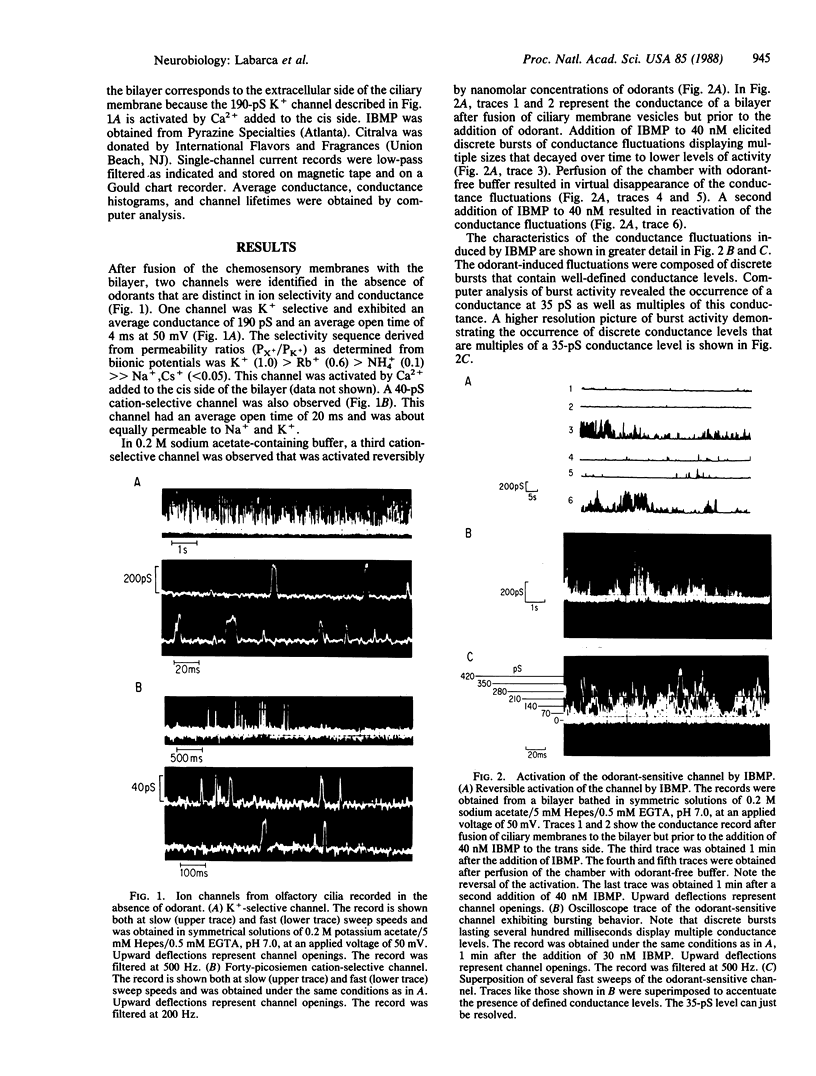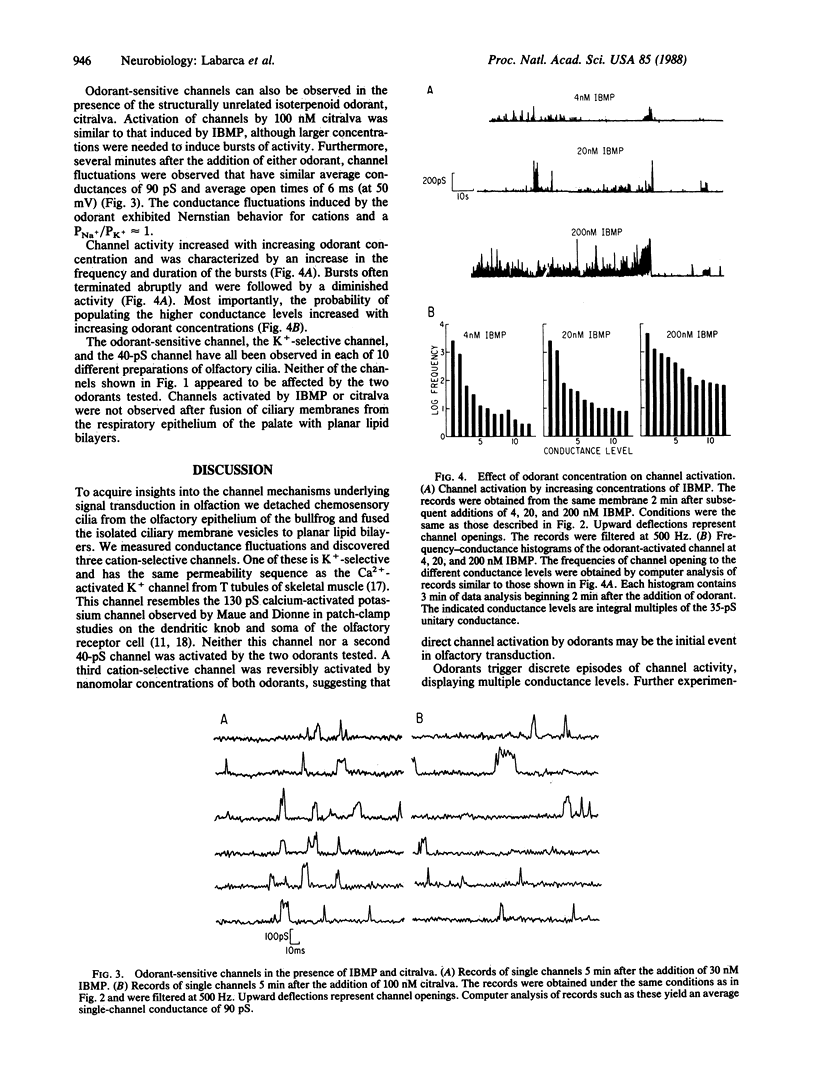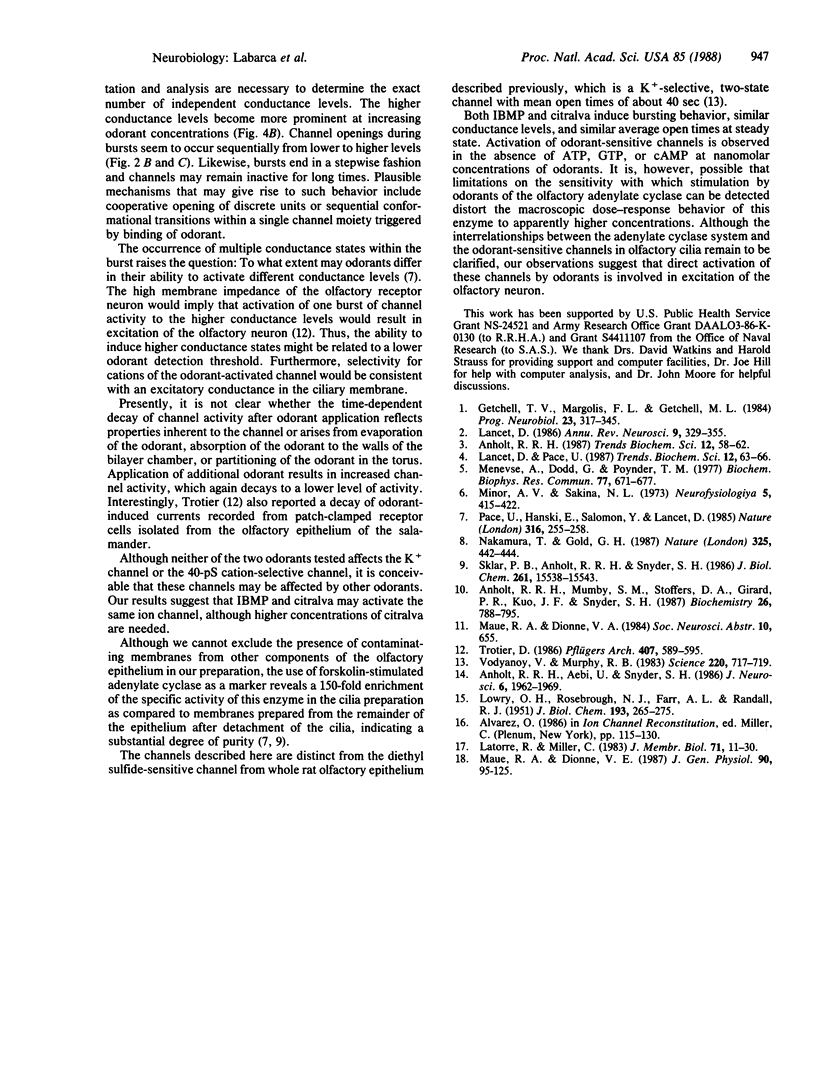Abstract
Single-channel records were obtained after fusion of ciliary membranes from the olfactory epithelium of Rana catesbeiana to planar lipid bilayers, and odorant-activated cation-selective channels were identified. In addition, a 190-pS potassium-selective channel and a 40-pS cation-selective channel were found in a 0.2 M salt-containing buffer. Odorant-sensitive channels were directly and reversibly activated by nanomolar concentrations of the bell pepper odorant 3-isobutyl-2-methoxypyrazine and the citrus odorant 3,7,-dimethyl-2,6-octadienenitrile. These channels display burst kinetics, multiple conductance levels between 35 and 420 pS, and open times in the millisecond range. With increasing concentrations of odorant, the probability of populating the higher conductance levels increases. These results show that direct activation of channels by odorants may mediate excitation of the olfactory receptor cell.
Full text
PDF



Selected References
These references are in PubMed. This may not be the complete list of references from this article.
- Anholt R. R., Aebi U., Snyder S. H. A partially purified preparation of isolated chemosensory cilia from the olfactory epithelium of the bullfrog, Rana catesbeiana. J Neurosci. 1986 Jul;6(7):1962–1969. doi: 10.1523/JNEUROSCI.06-07-01962.1986. [DOI] [PMC free article] [PubMed] [Google Scholar]
- Anholt R. R., Mumby S. M., Stoffers D. A., Girard P. R., Kuo J. F., Snyder S. H. Transduction proteins of olfactory receptor cells: identification of guanine nucleotide binding proteins and protein kinase C. Biochemistry. 1987 Feb 10;26(3):788–795. doi: 10.1021/bi00377a020. [DOI] [PubMed] [Google Scholar]
- Getchell T. V., Margolis F. L., Getchell M. L. Perireceptor and receptor events in vertebrate olfaction. Prog Neurobiol. 1984;23(4):317–345. doi: 10.1016/0301-0082(84)90008-x. [DOI] [PubMed] [Google Scholar]
- LOWRY O. H., ROSEBROUGH N. J., FARR A. L., RANDALL R. J. Protein measurement with the Folin phenol reagent. J Biol Chem. 1951 Nov;193(1):265–275. [PubMed] [Google Scholar]
- Lancet D. Vertebrate olfactory reception. Annu Rev Neurosci. 1986;9:329–355. doi: 10.1146/annurev.ne.09.030186.001553. [DOI] [PubMed] [Google Scholar]
- Latorre R., Miller C. Conduction and selectivity in potassium channels. J Membr Biol. 1983;71(1-2):11–30. doi: 10.1007/BF01870671. [DOI] [PubMed] [Google Scholar]
- Maue R. A., Dionne V. E. Patch-clamp studies of isolated mouse olfactory receptor neurons. J Gen Physiol. 1987 Jul;90(1):95–125. doi: 10.1085/jgp.90.1.95. [DOI] [PMC free article] [PubMed] [Google Scholar]
- Menevse A., Dodd G., Poynder T. M. Evidence for the specific involvement of cyclic AMP in the olfactory transduction mechanism. Biochem Biophys Res Commun. 1977 Jul 25;77(2):671–677. doi: 10.1016/s0006-291x(77)80031-4. [DOI] [PubMed] [Google Scholar]
- Minor A. V., Sakina N. L. Rol' tsiklicheskogo adenozin-3,5'-monofosfata v oboniatel'noi retseptsii. Neirofiziologiia. 1973 Jul-Aug;5(4):415–422. [PubMed] [Google Scholar]
- Nakamura T., Gold G. H. A cyclic nucleotide-gated conductance in olfactory receptor cilia. 1987 Jan 29-Feb 4Nature. 325(6103):442–444. doi: 10.1038/325442a0. [DOI] [PubMed] [Google Scholar]
- Pace U., Hanski E., Salomon Y., Lancet D. Odorant-sensitive adenylate cyclase may mediate olfactory reception. Nature. 1985 Jul 18;316(6025):255–258. doi: 10.1038/316255a0. [DOI] [PubMed] [Google Scholar]
- Sklar P. B., Anholt R. R., Snyder S. H. The odorant-sensitive adenylate cyclase of olfactory receptor cells. Differential stimulation by distinct classes of odorants. J Biol Chem. 1986 Nov 25;261(33):15538–15543. [PubMed] [Google Scholar]
- Trotier D. A patch-clamp analysis of membrane currents in salamander olfactory receptor cells. Pflugers Arch. 1986 Dec;407(6):589–595. doi: 10.1007/BF00582636. [DOI] [PubMed] [Google Scholar]
- Vodyanoy V., Murphy R. B. Single-channel fluctuations in bimolecular lipid membranes induced by rat olfactory epithelial homogenates. Science. 1983 May 13;220(4598):717–719. doi: 10.1126/science.6301014. [DOI] [PubMed] [Google Scholar]



